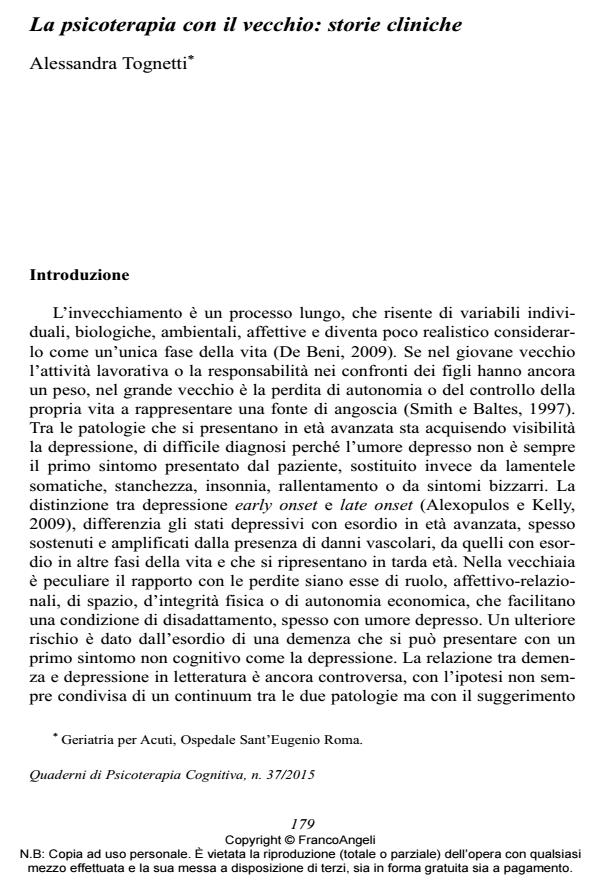Psychotherapy in aging: clinical pathways
Journal title QUADERNI DI PSICOTERAPIA COGNITIVA
Author/s Alessandra Tognetti
Publishing Year 2015 Issue 2015/37 Language Italian
Pages 9 P. 179-187 File size 87 KB
DOI 10.3280/QPC2015-037009
DOI is like a bar code for intellectual property: to have more infomation
click here
Below, you can see the article first page
If you want to buy this article in PDF format, you can do it, following the instructions to buy download credits

FrancoAngeli is member of Publishers International Linking Association, Inc (PILA), a not-for-profit association which run the CrossRef service enabling links to and from online scholarly content.
Ageing is a long process, characterized by great heterogeneity. Depression is a disease that occurs frequently in the last stages of life but with a set of symptoms often unclear and this condition makes an early diagnosis difficult sometimes. Depressed mood is not usually the first symptom shown by the patient, substituted instead by somatic complaints, insomnia, fatigue, poor memory or bizarre symptoms. The evaluation of biological, psychological and socio-environmental conditions is also important in the diagnosis process and also in any prognosis in the elderly. In this article the presentation of two clinical cases gives the opportunity to reflect on psychotherapy in the elderly. The first is a woman of 76 years old, with depression and perceptual alterations; the second one is an 87 year old man with problems of anxiety and depression. For both the intervention plan, provided weekly individual sessions. With an "old old" patient, it can promote ways of distancing to differentiate between objective and subjective reality, and between facts and interpretation. With the "oldest old" patient the project involves limited objectives and more direct strategies, with the aim of improving as much as possible the quality of life. Last but not the least, the role of the psychotherapist who must develop awareness, flexibility and creativity to compensate for the difficulty of identification with a patient who proposes issues and problems often far from their age and experience.
Keywords: Depression, aging, psychotherapy.
- Alexopulos G.S., Kelly R. Jr. (2009). Research advances in Geriatric Depression. World Psychology, 8(3):140-149.
- Bartorelli L., Tognetti A. (2013). Psicologia. In: Senin U., Bartorelli L., Salvioli G., a cura di, I grandi vecchi: curare ancora. Roma: Carocci Faber.
- Bizzini L., Bizzini V. (1999). In: Veglia F., a cura di, Storie di vita. Torino: Bollati Boringhieri.
- De Beni R., a cura di (2009). Psicologia dell’invecchiamento. Bologna: Il Mulino.
- Goves J., Jags S. et al. (2011). Depressive symptoms and incidence of Mild Cognitive Impairment and probable dementia in elderly women: the women’s health initiative memory study. J. Am. Geriaric. Soc., 59: 57-66.
- Jorm A. (2001). History of depression as a risk factor for dementia: an updated review. Aust. N. Z. J. Psychiatry, 35(6): 776-81.
- Moser F., Pezzati R., Luban Plozza B. (2002). Un’età da abitare. Torino: Bollati Boringhieri.
- Smith J., Baltes P.B. (1997). Profiles of Psychological Functioning in the Old and Oldest. Old, Psychology and Aging, 12: 3: 458-472.
Alessandra Tognetti, La psicoterapia con il vecchio: storie cliniche in "QUADERNI DI PSICOTERAPIA COGNITIVA" 37/2015, pp 179-187, DOI: 10.3280/QPC2015-037009